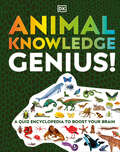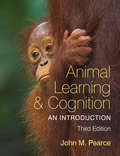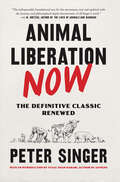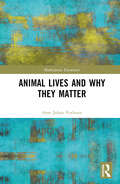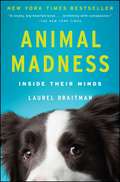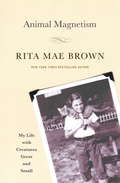- Table View
- List View
Animal Knowledge Genius: A Quiz Encyclopedia to Boost Your Brain (DK Knowledge Genius)
by DKBlow the minds of your friends and family with your animal knowledge. This brilliant nature quiz book is suited for hours of family fun! Do you know the difference between a great white shark and a giant manta ray? Can you spot the difference between a dung beetle and a tiger beetle? Challenge yourself and the family to this brain-busting nature challenge! In this exciting family activity book, you&’ll find: • &“Reference&” spreads which introduce a topic and give all the essential info. • &“Quiz&” pages, packed with pictures to pore over, put your knowledge to the test. • &“Test Yourself&” panels across three levels of difficulty — starter, challenger and genius. • A fun fact with every image gives a clue. • Answers appear upside down on the page. This stunning visual encyclopedia of animal knowledge is packed with hundreds of fantastic facts. It&’s an irresistibly interactive kids book that will have you challenging yourself and the family over and over again. This entertaining general knowledge book for kids will test your brainpower and challenge you to learn so much more. Can you complete all these levels of difficulty as the challenge gets harder? Packed with more than 60 topics across the animal world and eye-popping images, this animal activity book is excellent for brain training and makes learning way more fun. It&’s perfect for children ages 9-12, or geniuses of all ages. Look out for more fun family quiz books in this series from DK. Put your general knowledge skills to the test and take on the Knowledge Genius! brain-busting challenge!
Animal Labor and Colonial Warfare
by James L. HeviaUntil well into the twentieth century, pack animals were the primary mode of transport for supplying armies in the field. The British Indian Army was no exception. In the late nineteenth century, for example, it forcibly pressed into service thousands of camels of the Indus River basin to move supplies into and out of contested areas—a system that wreaked havoc on the delicately balanced multispecies environment of humans, animals, plants, and microbes living in this region of Northwest India. In Animal Labor and Colonial Warfare, James Hevia examines the use of camels, mules, and donkeys in colonial campaigns of conquest and pacification, starting with the Second Afghan War—during which an astonishing 50,000 to 60,000 camels perished—and ending in the early twentieth century. Hevia explains how during the nineteenth and twentieth centuries a new set of human-animal relations were created as European powers and the United States expanded their colonial possessions and attempted to put both local economies and ecologies in the service of resource extraction. The results were devastating to animals and human communities alike, disrupting centuries-old ecological and economic relationships. And those effects were lasting: Hevia shows how a number of the key issues faced by the postcolonial nation-state of Pakistan—such as shortages of clean water for agriculture, humans, and animals, and limited resources for dealing with infectious diseases—can be directly traced to decisions made in the colonial past. An innovative study of an underexplored historical moment, Animal Labor and Colonial Warfare opens up the animal studies to non-Western contexts and provides an empirically rich contribution to the emerging field of multispecies historical ecology.
Animal Languages: The secret conversations of the living world
by Eva Meijer'A rich compendium of incidents, anecdotes and studies illustrating the linguistic abilities of animals . . . a rewarding book' Sunday TimesDolphins and parrots call each other by their names. Fork tailed drongos mimic the calls of other animals to scare them away and then steal their dinner. In the songs of many species of birds, and in skin patterns of squid, we find grammatical structures . . .If you are lucky, you might meet an animal that wants to talk to you. If you are even luckier, you might meet an animal that takes the time and effort to get to know you. Such relationships can teach us not only about the animal in question, but also about language and about ourselves.From how prairie dogs describe intruders in detail -- including their size, shape, speed and the colour of their hair and T-shirts -- to how bats like to gossip, to the impressive greeting rituals of monogamous seabirds, Animal Languages is a fascinating and philosophical exploration of the ways animals communicate with each other, and with us. Researchers are discovering that animals have rich and complex languages with grammatical and structural rules that allow them to strategise, share advice, give warnings, show love and gossip amongst themselves. Animal Languages will reveal this surprising hidden social life and show you how to talk with the animals.
Animal Law Worldwide: Key Issues and Main Trends Across 27 Jurisdictions
by Federico Dalpane Maria BaideldinovaThis book offers a unique panoramic survey of the state of animal law in twenty-six countries and in the legal system of the European Union. The authors give a brief introduction to each jurisdiction, examine key issues, and formulate recommendations. The contributions provide ample opportunities for legal comparative studies touching on constitutional law, criminal law, civil law, environmental law, and administrative law, and discuss the crucial role of NGOs and civil society in raising awareness for the plight of animals. The contributions show the mature stage reached by the discipline of animal law, which is gaining attention in wider circles. The book discusses wildlife, agricultural animals, experimental animals, service animals, stray animals, and others. One of the topics is the constitutionalisation of animal welfare (with a growing number of countries amending their constitutions to include the protection of animals or considering such amendments). Other topics include the trend of moving away from the age-old legal classification of animals as mere things, and the persistent weaknesses in the implementation of legal provisions for the protection of animals. This book will be of keen interest to the worldwide animal law community, legal comparatists, legal theorists, policy makers, judges, law enforcement officials, as well as veterinary doctors. Federico Dalpane is an assistant professor at KIMEP University, College of Social Sciences. Maria Baideldinova is an assistant professor at KIMEP University, School of Law.
Animal Law and Welfare - International Perspectives (Ius Gentium: Comparative Perspectives on Law and Justice #53)
by Deborah Cao Steven WhiteThisbook focuseson animal laws and animal welfare in major jurisdictions in the world,including the more developed legal regimes for animal protection of the US, UK,Australia, the EU and Israel, and the regulatory regimes still developing inChina, South Africa, and Brazil. It offers in-depth analyses and discussions oftopical and important issues in animal laws and animal welfare, and provides acomprehensive and comparative snapshot of some of the most important countriesin the world in terms of animal population and worsening animal cruelty. Amongthe issues discussed are international law topics that relate to animals,including thelatest WTO ruling on seal products and the EU ban, the Blackfish story and USlaw for cetaceans, the wildlife trafficking and crimes related to Africa andChina, and historical and current animal protection laws in the UK andAustralia. Bringing together the disciplines of animal law and animal welfarescience as well as ethics and criminology with contributions from some of the mostprominent animal welfare scientists and animal law scholars in the world, the book considers the strengths and failings ofexisting animal protection law in different parts of the world. In doing so itdraws more attention to animal protection as a moral and legal imperative andto crimes against animals as a serious crime.
Animal Learning and Cognition: An Introduction
by John M. PearceAnimal Learning and Cognition: An Introduction provides an up-to-date review of the principal findings from more than a century of research into animal intelligence. This new edition has been expanded to take account of the many exciting developments that have occurred over the last ten years. The book opens with a historical survey of the methods that have been used to study animal intelligence, and follows by summarizing the contribution made by learning processes to intelligent behavior. Topics include Pavlovian and instrumental conditioning, discrimination learning, and categorization. The remainder of the book focuses on animal cognition and covers such topics as memory, navigation, social learning, language and communication, and knowledge representation. Expanded areas include extinction (to which an entire chapter is now devoted), navigation in insects, episodic memory in birds, imitation in birds and primates, and the debate about whether primates are aware of mental states in themselves and others. Issues raised throughout the book are reviewed in a concluding chapter that examines how intelligence is distributed throughout the animal kingdom. The broad spectrum of topics covered in this book ensures that it will be of interest to students of psychology, biology, zoology, and neuroscience. Since very little background knowledge is required, the book will be of equal value to anyone simply interested in either animal intelligence, or the animal origins of human intelligence. This textbook is accompanied by online instructor resources which are free of charge to departments who adopt this book as their text. They include chapter-by-chapter lecture slides, an interactive chapter-by-chapter multiple-choice question test bank, and multiple-choice questions in paper and pen format.
Animal Lectins: A Functional View
by Hafiz Ahmed Gerardo R. VastaIntroduces Groundbreaking Approaches for Assessing Lectin Function Lectins and their ligands are under quite a heavy microscope due to their potential applications to pharmacology, immunology, cancer therapy, and agriculture. With growing interest in the glycobiology field, the body of research related to lectin roles has grown at an explosive rate
Animal Lectins: Form, Function And Clinical Applications
by Rajesh K. Gupta Anita Gupta G. S. GuptaAnimal Lectins: Form, Function and Clinical Applications presents up-to-date knowledge of animal lectins. Detailed descriptions on biological activities, tissue and/or subcellular distribution, molecular structure, gene organization, possible functions, clinical applications, lectin-ligand interactions and their intervention for therapeutic purposes are provided. The recently discovered C-type lectins as well as further novel super-families of this group of molecules are described in detail. Furthermore, the clinical significance of animal lectins in inflammatory diseases, defects of immune defense and autoimmunity are described and their application as drugs and therapeutic targets is discussed. With the increasing interest in lectins in biomedical research and their therapeutic applications, this book on animal lectins and associated proteins is a must have for researchers in the area.
Animal Lessons: Discovering Your Spiritual Connection with Animals
by Danielle MacKinnonDevelop a deeper, more positive relationship with the animals in your life and become a better person using Animal Lessons. All around you, animals are acting as therapists, trainers, mentors, and gurus—if you pay attention. They want to guide you toward the next step in your personal evolution, and this first-of-its-kind book shows you how to understand and benefit from them.Having worked deeply and intuitively with animals for nearly twenty years, Danielle MacKinnon has a wealth of wisdom that she shares through helpful tools and techniques, client stories, and her step-by-step process for personal growth through animal guidance. With an open heart and mind, you'll develop a new awareness and stronger love of yourself as well as the wise creatures in your life.Praise:"MacKinnon, a psychic medium, blends personal stories with tips and tools aimed at helping readers discover a deeper relationship with their pets. Animals, she writes, often act as therapists, trainers, mentors, and gurus, and can offer lessons on love, patience, happiness, and gratitude."—Publishers Weekly
Animal Lessons: How They Teach Us to Be Human
by Kelly OliverPhilosophy reads humanity against animality, arguing that "man" is man because he is separate from beast. Deftly challenging this position, Kelly Oliver proves that, in fact, it is the animal that teaches us to be human. Through their sex, their habits, and our perception of their purpose, animals show us how not to be them. This kinship plays out in a number of ways. We sacrifice animals to establish human kinship, but without the animal, the bonds of "brotherhood" fall apart. <P><P>Either kinship with animals is possible or kinship with humans is impossible. Philosophy holds that humans and animals are distinct, but in defending this position, the discipline depends on a discourse that relies on the animal for its very definition of the human. Through these and other examples, Oliver does more than just establish an animal ethics. She transforms ethics by showing how its very origin is dependent upon the animal. Examining for the first time the treatment of the animal in the work of Heidegger, Merleau-Ponty, Derrida, Agamben, Freud, Lacan, and Kristeva, among others, Animal Lessons argues that the animal bites back, thereby reopening the question of the animal for philosophy.
Animal Liberation Now: The Definitive Classic Renewed
by Peter SingerTHE UPDATED CLASSIC OF THE ANIMAL RIGHTS MOVEMENT, NOW WITH AN INTRODUCTION BY YUVAL NOAH HARARI Few books maintain their relevance—and have remained continuously in print—nearly fifty years after they were first published. Animal Liberation, one of TIME’s “All-TIME 100 Best Nonfiction Books” is one such book. Since its original publication in 1975, this groundbreaking work has awakened millions of people to the existence of "speciesism"—our systematic disregard of nonhuman animals—inspiring a worldwide movement to transform our attitudes to animals and eliminate the cruelty we inflict on them. In Animal Liberation Now, Singer exposes the chilling realities of today's "factory farms" and product-testing procedures, destroying the spurious justifications behind them and showing us just how woefully we have been misled. Now, Singer returns to the major arguments and examples and brings us to the current moment. This edition, revised from top to bottom, covers important reforms in the European Union and in various U.S. states, but on the flip side, Singer shows us the impact of the huge expansion of factory farming due to the exploding demand for animal products in China. Further, meat consumption is taking a toll on the environment, and factory farms pose a profound risk for spreading new viruses even worse than COVID-19. Animal Liberation Now includes alternatives to what has become a profound environmental and social as well as moral issue. An important and persuasive appeal to conscience, fairness, decency, and justice, it is essential reading for the supporter and the skeptic alike.
Animal Liberation: The Definitive Classic of the Animal Movement
by Peter SingerThe groundbreaking book that challenged the ethics of our treatment of animals and jump-started the animal rights movement--with a new preface by the author First published in 1975, Animal Liberation created a sensation upon its release, shaking the world's philosophical and animal-protection circles to their cores. Now, forty years later, Peter Singer's landmark work still looms large as a foundational and canonical text of animal advocacy. Arguing that all beings capable of suffering deserve equal consideration, Singer contends that the only justifiable treatment of animals is that which maximizes good and minimizes suffering. In examining the cruelty of factory farming and the exploitation, both commercial and scientific, of laboratory animals, he identifies a kind of "ethical blindness" and calls for political action. A moral wake-up call from one of the most influential and controversial ethicists of our time, Animal Liberation tackles an emotionally charged social issue with a compelling rational argument in a rousing and riveting read. This ebook features an illustrated biography of Peter Singer, including rare photos from the author's personal collection.
Animal Liberation: The Definitive Classic of the Animal Movement (2nd Edition)
by Peter SingerSince its original publication in 1975, this groundbreaking work has awakened millions of people to the existence of "speciesism"--our systematic disregard of nonhuman animals--inspiring a worldwide movement to transform our attitudes to animals and eliminate the cruelty we inflict on them. In Animal Liberation, author Peter Singer exposes the chilling realities of today's "factory farms" and product-testing procedures--destroying the spurious justifications behind them, and offering alternatives to what has become a profound environmental and social as well as moral issue. An important and persuasive appeal to conscience, fairness, decency, and justice, it is essential reading for the supporter and the skeptic alike.
Animal Life: Secrets of the Animal World Revealed
by American Museum of Natural History Charlotte UhlenbroekIf you think that watching all the nature programs on television qualifies you as an expert on the subject, think again! Do you really know what makes animals tick? Here are the answers, portrayed in stunning, awe-inspiring action sequences and explained in fascinating, in-depth prose. <p><p>Thematically arranged by behavior trait, Animal Life explores and explains every aspect of animal behavior, including courtship rituals and sex lives, family relationships and defense mechanisms, hunting techniques and feeding habits. Side panels explore some of the field research on animal behavior and explain important conservation issues. The introductory chapters on the Animal Kingdom and on animal anatomy help explain how different animals have evolved and adapted to their environments, adaptations that may be relevant to particular behaviors. <p><p>Destined to be the ultimate authority on animal behavior, this book also looks at key behavioral concepts such as how animals learn to behave and the role of instinct in the learning process. <p><p>AUTHOR BIO: Charlotte Uhlenbroek, Ph.D. spent four years in the forests of Gombe, Tanzania, completing her doctorate in chimpanzee communication under the auspices of world-famous Jane Goodall. Uhlenbroek is an accomplished broadcaster, appearing in many prestigious documentaries produced by the BBC Wildlife Unit, including Talking with Animals (2002) on communications of creatures as diverse as cuttlefish and wolves, Jungle on the world's rain forests, and the 20-part series Safari School (2007). She has published two books to accompany these series, Talking with Animals and Jungle, both of which are now out of print.
Animal Lives Matter: The Continuing Quest for Justice
by Raymond WacksAnimal Lives Matter provides a comprehensive analysis of the legal, philosophical, and ethical aspects of animal rights. It argues that the subject extends beyond the matter of our obligations towards animals, to include our wider responsibilities for protecting the environment. Drawing on numerous moral, political, legal, religious, and philosophical theories including utilitarianism, deontology, rights theory, social contractarianism, and the capabilities approach, the author meticulously examines the questions of sentience, speciesism, personhood, and human exceptionalism. Lucid, nuanced, and academically rigorous, this important book will be an essential resource for scholars of law, politics, philosophy, ethics, as well as policy makers and the general reader.
Animal Lives and Why They Matter (Multispecies Encounters)
by Arne Johan VetlesenThis book engages with the changing ways in which we, as a society and culture, look upon and interact with animals, stressing how much animals differ among themselves. An invitation to appreciate the peculiar role of animals in telling important if uncomfortable truths about who we are and where we are heading – namely, towards a world so much poorer in cultural, moral, and biological diversity – as a result of the ongoing decimation of so many other species. Drawing on a variety of thought ranging from that of Midgley, Plumwood, and Murdoch to Levinas, Derrida, and Habermas, from ecophilosophers to conservation biologists, Animal Lives and Why They Matter asks how we have come to this, and what an alternative, less destructive approach to our now precarious coexistence with animals might look like. Spanning the disciplines of philosophy, psychology, and anthropology, this enquiry into various cross-species relationships and encounters will appeal to scholars and students across the humanities and social sciences with interests in philosophy, ethics, human-animal interaction, and environmental thought.
Animal Locomotion: Physical Principles and Adaptations
by Malcolm S. Gordon Reinhard Blickhan John O. Dabiri John J. VidelerAnimal Locomotion: Physical Principles and Adaptations is a professional-level, state of the art review and reference summarizing the current understanding of macroscopic metazoan animal movement. The comparative biophysics, biomechanics and bioengineering of swimming, flying and terrestrial locomotion are placed in contemporary frameworks of biodiversity, evolutionary process, and modern research methods, including mathematical analysis. The intended primary audience is advanced-level students and researchers primarily interested in and trained in mathematics, physical sciences and engineering. Although not encyclopedic in its coverage, anyone interested in organismal biology, functional morphology, organ systems and ecological physiology, physiological ecology, molecular biology, molecular genetics and systems biology should find this book useful.
Animal Look-Alikes
by Rachel Griffiths Margaret ClyneDiscusses the similarities and differences seen in moths and butterflies, alligators and crocodiles, frogs and toads, and seals and sea lions.
Animal Machines
by Ruth Harrison Marian Stamp-DawkinsRuth Harrison's Animal Machines now a unique historical classic, had a profound impact on public opinion and the quality of life of farmed animals when it was published in 1964. * Reprinted in its entirety, gives an accurate, and sometimes shocking, account of intensive farming in the 1960's, still current in large parts of the world today. * Harrison's work greatly increased public awareness of animal welfare and led to legal reforms, shaping our closer understanding of farm conditions today. * Provides a fascinating insight into the system we continue to live with as the global population increases. * Includes foreword by Rachel Carson and new chapters by international experts in animal welfare including Marion Stamp Dawkins, discussing the book's significant legacy and impact today.
Animal Madness: How Anxious Dogs, Compulsive Parrots, and Elephants in Recovery Help Us Understand Ourselves
by Laurel Braitman**“Science Friday” Summer Reading Pick** **Discover magazine Top 5 Summer Reads** **People magazine Best Summer Reads** “A lovely, big-hearted book…brimming with compassion and the tales of the many, many humans who devote their days to making animals well” (The New York Times).Have you ever wondered if your dog might be a bit depressed? How about heartbroken or homesick? Animal Madness takes these questions seriously, exploring the topic of mental health and recovery in the animal kingdom and turning up lessons that Publishers Weekly calls “Illuminating…Braitman’s delightful balance of humor and poignancy brings each case of life….[Animal Madness’s] continuous dose of hope should prove medicinal for humans and animals alike.” Susan Orlean calls Animal Madness “a marvelous, smart, eloquent book—as much about human emotion as it is about animals and their inner lives.” It is “a gem…that can teach us much about the wildness of our own minds” (Psychology Today).
Animal Magic: The Extraordinary Proof of Our Pets' Intuition and Unconditional Love for Us
by Gordon SmithGordon Smith is well known for giving powerful messages from people’s loved ones on the other side. Very often it’s not just human friends and family who come through – the animals who have been close to us in life also continue to visit us after death.In this extraordinary book, Gordon recounts some of the remarkable experiences that people have had with animals in the spirit world and in our world. They include moving accounts of dogs who know intuitively when their owners are coming home, pets who saved their owners’ lives and animals who have found ways of proving they are still with their families after death. Throughout the book, Gordon shares his own experiences with his springer spaniel ‘Cheeky’ Charlie, who came into his life unexpectedly, completely overturning it and showing Gordon the beauty of trust, patience and unconditional love.Through these amazing stories, Gordon shows just how deeply animals care for their human families and the profound understanding they have of the world around them. This is a repackage of The Amazing Power of Animals (978-1-4019-2325-9)
Animal Magnetism: My Life with Creatures Great and Small
by Rita Mae BrownA heartfelt memoir from bestselling author Rita Mae Brown about the animals who have loved, endured, and taught her, and about her bottomless love for them.
Animal Maltreatment Evaluation Basics for Mental Health Practitioners, Students, and Educators
by Lynett Henderson Metzger Laura Meyer Lavita NadkarniThis book provides a brief introduction to the growing field of animal maltreatment evaluation and treatment, with a special emphasis on clinical training from a forensic psychology perspective. Geared toward mental health practitioners, students, and educators, this broad overview focuses on foundational legal concepts, applications in clinical and psycholegal settings, and emerging perspectives on effective evaluation and treatment. The authors provide practical guidance around “real world” scenarios through the use of clinical case vignettes, highlighting the complexities and need for culturally- and psychologically-informed care in these cases. Key topics include forensic animal maltreatment evaluations (or FAMEs); implications for best practices; challenges for providers, trainees, and supervisors; and future directions for the field.
Animal Management and Welfare in Natural Disasters
by James Sawyer Gerardo HuertasThe devastating impacts of natural disasters not only directly affect humans and infrastructure, but also animals, which may be crucial to the livelihoods of many people. This book considers the needs of animals in the aftermath of disasters and explains the importance of looking to their welfare in extreme events. The authors explore how animals are affected by specific disaster types, what their emergency and subsequent welfare needs are and the appropriate interventions. They describe the key benefits of management of animals to populations and discuss preventative measures that can be taken to reduce risk and build resilience. They also include a summary of recent debates and public policy advances on animals in disasters. The book covers livestock, companion and wild animals, with case studies to show how the concepts can be put into practice. It provides a standalone text for students of disaster studies and management as well as professionals and NGOs who require an entry-level introduction to the subject.
Animal Manure Recycling
by Morten L. Christensen Sven G. Sommer Thomas Schmidt Lars Stoumann JensenA rapidly changing and expanding livestock and poultry production sector is causing a range of environmental problems on local, regional and global scales. Animal Manure Recycling: Treatment and Management presents an accessible overview of environmentally friendly technologies for managing animal manure more efficiently and in a sustainable manner. The book describes the physical and chemical characteristics of animal manure and microbial processes, featuring detailed examples and case studies showing how this knowledge can be used in practice. Readers are introduced to the sustainable use of animal manure for crop fertilisation and soil amelioration. Environmentally friendly technologies for reducing emissions of ammonia, odour and the greenhouse gases nitrous oxide and methane are presented, and reduction of plant nutrient losses using separation technologies is introduced. Finally and most importantly, the book describes methods to commercialise and transfer knowledge about innovations to end-users.Topics covered include:Regulation of animal manure managementManure organic matter: characteristics and microbial transformationsGreenhouse gas emissions from animal manures and technologies for their reductionTechnologies and logistics for handling, transport and distribution of animal manuresBioenergy productionAnimal manure residue upgrading and nutrient recovery in bio-fertilisersLife cycle assessment of manure management systemsInnovation in animal manure management and recyclingAnimal Manure Recycling: Treatment and Management presents state-of-the-art coverage of the entire animal manure chain, providing practical information for engineers, environmental consultants, academics and advanced students involved in scientific, technical and regulatory issues related to animal manure management.
